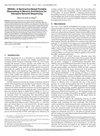在小型硬件交易中实现前向进度保证
IF 1.4
3区 计算机科学
Q4 COMPUTER SCIENCE, HARDWARE & ARCHITECTURE
引用次数: 0
摘要
硬件事务内存(HTM)之所以能引起学术界和工业界的兴趣,是因为它具有在不影响性能的情况下简化并发编程的潜力。它为程序员提供了一个简单的 "全有或全无 "的想法,使一段代码在硬件中看起来是原子的。尽管如此,在研究中也有许多优雅的 HTM 实现,但只有尽力 HTM 可用于商业用途。尽力 HTM 缺乏前向进展保证,使得程序员更难创建并发的可扩展后备路径。这使得 HTM 的适应性受到限制。HTM 可支持大量应用,因此需要在设计和验证复杂性与前向进度保证之间进行权衡。在这封信中,我们认为限制应用范围有助于 HTM 实现有保证的前进。我们通过将 HTM 用作多字原子来支持无锁程序,并展示了在硬件中完全实现无锁的策略性设计选择。我们使用无锁微基准套件 lfbench 和 gem5 模拟器上的 Arm 最佳 HTM(ARM_TME)作为基础。我们展示了基于延迟、基于 NACK 和 NACK-with-backoff 方法的设计选择之间的性能权衡。我们表明,对于读取和写入密集型应用而言,带后退的 NACK 性能优于其他方法,且不影响可扩展性。本文章由计算机程序翻译,如有差异,请以英文原文为准。
Achieving Forward Progress Guarantee in Small Hardware Transactions
Hardware-transactional-memory (HTM) manages to pique interest from academia and industry alike because of its potential to ease concurrent-programming without compromising on performance. It offers a simple “all-or-nothing” idea to the programmer, making a piece of code appear atomic in hardware. Despite this and many elegant HTM implementations in research, only best-effort HTM is available commercially. Best-effort HTM lacks forward progress guarantee making it harder for the programmer to create a concurrent scalable fallback path. This has made HTM's adaptability limited. With a scope to support a myriad of applications, HTMs do a trade off between design and verification complexity vs forward progress guarantee. In this letter, we argue that limiting the scope of applications helps HTM attain guaranteed forward progress. We support lock-free programs by using HTM as multi-word-atomics and demonstrate strategic design choices to achieve lock-freedom completely in hardware. We use lfbench, a lock-free micro-benchmark-suite, and Arm's best-effort HTM (ARM_TME) on the gem5 simulator, as our base. We demonstrate the performance tradeoffs between design choices of a deferral-based, NACK-based, and NACK-with-backoff approaches. We show that NACK-with-backoff performs better than the others without compromising scalability for both read- and write-intensive applications.
求助全文
通过发布文献求助,成功后即可免费获取论文全文。
去求助
来源期刊

IEEE Computer Architecture Letters
COMPUTER SCIENCE, HARDWARE & ARCHITECTURE-
CiteScore
4.60
自引率
4.30%
发文量
29
期刊介绍:
IEEE Computer Architecture Letters is a rigorously peer-reviewed forum for publishing early, high-impact results in the areas of uni- and multiprocessor computer systems, computer architecture, microarchitecture, workload characterization, performance evaluation and simulation techniques, and power-aware computing. Submissions are welcomed on any topic in computer architecture, especially but not limited to: microprocessor and multiprocessor systems, microarchitecture and ILP processors, workload characterization, performance evaluation and simulation techniques, compiler-hardware and operating system-hardware interactions, interconnect architectures, memory and cache systems, power and thermal issues at the architecture level, I/O architectures and techniques, independent validation of previously published results, analysis of unsuccessful techniques, domain-specific processor architectures (e.g., embedded, graphics, network, etc.), real-time and high-availability architectures, reconfigurable systems.
 求助内容:
求助内容: 应助结果提醒方式:
应助结果提醒方式:


